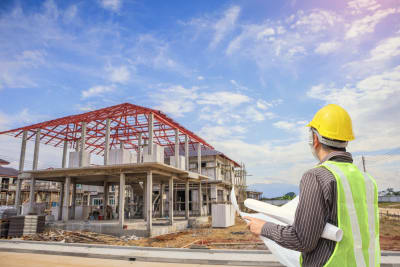Masons are professionals who use bricks, concrete, blocks, and other materials to construct walls, walkways, and other vital structures. Typically, masons have to be good with their hands, but they also have to be able to carry out different tasks related to the job that doesn’t necessarily involve dexterity.
Below, we’ll be looking at what the masonry occupation involves. We’ll discuss the job duties, work environment, and steps to becoming a mason.
We’ll also explore the possible areas of specialization in the field and the potential salary/job outlook so that aspiring masons know precisely what to expect as they begin the journey.
What Do Masons Do?
Masons fabricate incredible and valuable structures from natural and artificial materials such as bricks, concrete, and stones.
The structures built by masons are known to be some of the most durable, thanks to the quality of materials used. And while, as we’ll see below, a masonry worker can fall into different specialty areas, their overall duties and everyday tasks are very similar.
During their profession, masonry workers must break and cut materials into size and build structures with them. Still, they will also read blueprints and drawings, layout patterns and form foundations, and mix mortar/grout to spread onto a slab.
Also, masons must ensure the structures they build align using levels and plumbs.
Mason Work Environment
Being a mason can be very rewarding in terms of offering stable employment, a respectable income, and an outlet for creativity. The job can be strenuous.
Masonry workers often work outdoors, but spending much time indoors is possible. Masons must be physically healthy regardless of where they work, as they must lift several heavy materials during a single day’s job.
Additionally, masons’ work requires occasional standing, kneeling, and bending for extended periods. A mason must also be prepared to work in dirty, muddy, dusty, or humid environments.
How To Become a Masonry Worker
There is a bit of variation regarding a mason’s path to becoming a professional. Usually, however, most follow the same overarching direction, which involves the following steps:
1. Education Prerequisites
The path to becoming a masonry worker requires training. But before that, an aspiring mason should always endeavor to acquire a high school diploma or GED. This is usually handy when applying for admission into apprenticeship programs and technical schools.
2. Training
Most masons acquire their training on-the-job by either working as a mason’s assistant and learning under them or enrolling in an apprenticeship training program.
Most of these programs are organized by unions and contractor associations.
As mentioned earlier, it is also possible for a mason to get a formal education by enrolling in a technical college program instead. These programs often work with apprenticeship programs to ensure that students get the hands-on training experience they need to complement the classroom sessions.
3. Occupational Shift
It is also possible to become a masonry worker by shifting from a construction-related job. Through this approach, those who wish to become masons may work as assistants to professional masons before branching out independently.
Masonry Worker Specializations
Below are some common areas of specialization for masonry workers:
- Brick masons/ Block masons - Brick masons, also known as bricklayers, are masonry workers who typically build and repair walls with bricks, masonry panels, concrete blocks, and terracotta. It is also possible for brick masons to specialize further as refractory masons, a field of masonry that involves building with materials resistant to heat and fire.
- Stonemasons - As the name implies, Stonemasons are masonry workers who specialize in building and repairing structures with stones. A stone mason may work strictly with natural materials such as limestone, granite, and marble or artificial stone materials such as fabricated marble chips.
- Cement Masons - Cement masons, also known as concrete finishers, are masonry experts who work with concrete. They have an extensive understanding of how concrete is affected by external materials, and they leverage this knowledge to build concrete structures that are more durable than others.
In addition to the actual concrete, concrete masons may use lath to support the concrete structure.
- Terrazzo Workers - Terrazzo masons build structures with terrazzo. This could include walkways, patios, panels, and floors. Terrazzo masonry usually involves the same basic setup as cement masonry.
Along with terrazzo, terrazzo masons may also use marble chips to embellish their works further.
Masonry Worker Salaries
The Bureau of Labor Statistics revealed that the median annual wage for masons in 2021 was $48,040. Factors such as area of specialization, industries, location, and experience all influence how much a masonry worker earns in a year.
Those who fall into the top ten percent of earners may earn an annual average salary of $78,810, while those who fall into the bottom ten percent usually earn around $33,590 annually.
Sorting by specialization, brick masons earn the highest with an annual average salary of $59,340. Terrazzo and stone masons follow with an average yearly salary of $48,680 and $47,610, respectively. Cement masons round up the list with an annual average wage of $47,340.
As for the industries with the highest salary, masonry contractors lead the way with a $54,350 average salary, while those who work in the construction of buildings and masons in civil engineering construction follow with averages of $48,631 and $47,890, respectively.
Masonry Worker Job and Career Outlook
The Bureau of Labor Statistics estimates that the demand for masonry workers will decline by 2% between 2021 to 2031. Still, despite the decline, more than 23,000 job openings will emerge for masonry workers each year within that period.
These positions will open up thanks to the need to replace workers who move to other occupations and the need for new buildings and road construction.





